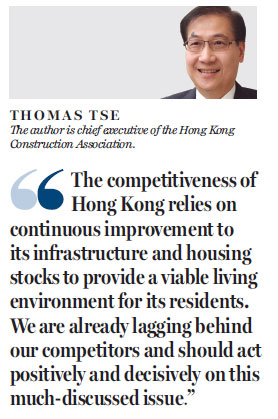Importing workers crucial to Hong Kong's competitiveness
Updated: 2016-01-26 08:15
By Thomas Tse(HK Edition)
|
|||||||
As a trade association representing the main contractors in the construction sector, the Hong Kong Construction Association (HKCA) welcomes the long-awaited announcement by the SAR government in the 2016 Policy Address to speed up the importation of foreign construction workers.
It has been an undeniable fact that over the past several years the supply of local construction workers has fallen short of demand by as much as 10,000 to 15,000. As a result of the shortage of skilled workers, a decline in overall productivity, persistent market volatility and other unwanted factors, many construction projects in the city have been delayed while the cost of construction has escalated to a level among the highest in the world. Based on the results of the regular biannual survey conducted among HKCA members since 2012, Hong Kong needs an additional 12-16 percent more workers to meet the needs of all the ongoing construction projects in the city.
The current problem of a shortage of skilled workers and an aging construction workforce is attributable to the continued decline in construction volume during the period between 1999 and 2008. This long period of low project volume forced many capable and skilled tradesmen to change jobs and leave the industry before its recent upturn. Now that more than 40 percent of our registered construction workers are aged over 50, one can reasonably expect that overall construction manpower could decline sharply over the next few years. To maintain the vitality and sustainability of the industry, we need to find ways and be prepared to replenish its manpower to readily fill the gap when a potentially large number of tradesmen spend less time working or leave the industry altogether for retirement.
Local workers are always preferred because of their skills and understanding of local practices. Since 2010, stakeholders in the industry have worked together and actively recruited locals to join the construction workforce. Despite this and numerous training incentives, wage increases and "hire-first and train-later" schemes having been offered to local young people, only 15,000 new workers joined and completed industry training in the past four years. It is high time Hong Kong accepted the fact that very few local young people will be attracted to develop careers as construction workers.
With many committed projects to be finished, we need temporary relief of manpower from alternate sources. This relief is also needed to provide some breathing space for the overstressed labor market and make room for freshly trained new local workers to acquire enough skills rather than pressuring them with too heavy a workload.
The government has recently established a construction industry recruitment center operated by the Labour Department. Local tradesmen can now visit, physically or through the Internet, this one-stop shop to look for a suitable job. Finding a job and recruiting for a post could not be easier. This conveniently centralized service should change the engrained recruitment culture among workers over time. The job vacancies and job matching results should help the industry better understand the dynamics of the construction labor market in more detail.
The competitiveness of Hong Kong relies on continuous improvement to its infrastructure and housing stocks to provide a viable living environment for its residents. We are already lagging behind our competitors and should act positively and decisively on this much-discussed issue.

(HK Edition 01/26/2016 page10)